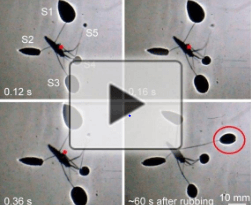Oct 20 2016
Water striders' ability to walk and jump on the surfaces of ponds and lakes has long amazed curious observers -- and inspired robot designers who want to mimic the bugs' talent. Now, scientists have measured for the first time key parameters that allow them to walk on water -- by studying their leg shadows. The findings, reported in the ACS journal Langmuir, could contribute to designs for water-skimming robots.
 An insect’s shadows yield new clues that help explain its ability to walk on water. Credit: American Chemical Society
An insect’s shadows yield new clues that help explain its ability to walk on water. Credit: American Chemical Society
More than 2,000 years ago, Greek scientist Archimedes explained flotation, stating that the upward, floating force on an object in water equals the weight (or downward force) of the water displaced. The principle has informed the building of ships, submarines and other aquatic vehicles. But for tiny water striders, water isn't displaced. It is expelled by the insect's hairy legs. The updated Archimedes principle predicts that the weight of the expelled water should equal the floating force. But confirming this prediction experimentally is a challenge. Because water striders are so light, they are almost impossible to weigh using conventional techniques. So Yu Tian and colleagues used an unconventional method -- analyzing the shadows cast by the insects' legs.
The researchers placed a white sheet of paper at the bottom of a lab aquarium housing water striders and installed a light source above the water. The insects' stick-straight legs cast shadows that were rounded, representing the curvature of the water and the expelled water volume from which the floating force and weight can be calculated, the researchers say. Also, from these measurements, the striders' slightest shifts in weight and body angle could be detected for the first time.